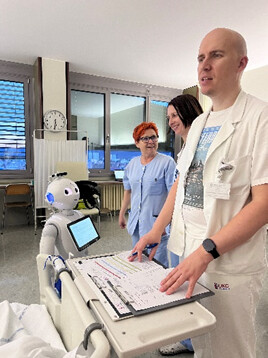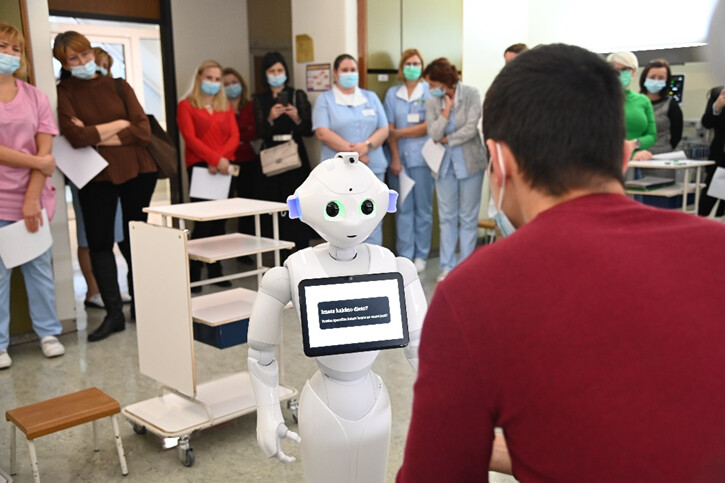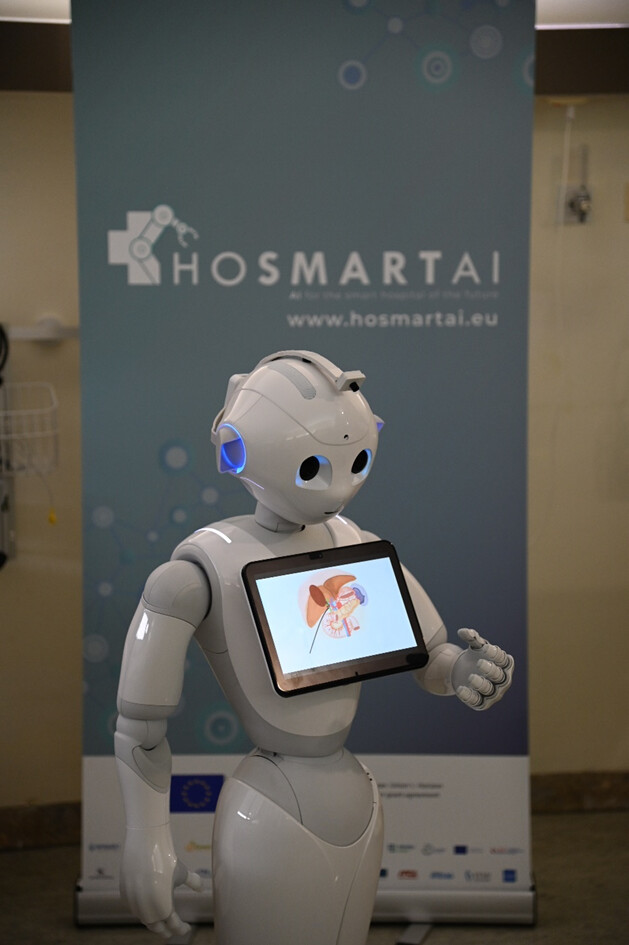The Hosmartai project started at the beginning of 2021. The Slovenian partners University Medical Centre of Maribor (UKCM) and University of Maribor (UM) Faculty of Electrical Engineering and Computer Science collaborated and co-created the concept of Pilot 5 - generally known as the social robot ‘nurse’ Frida.
After the Frida idea UKCM and UM determined the hospital needs and goals of the project and engineered the robot circuit that it suited the expectations of an administration ‘nurse.’ ‘Nurse’ Frida first entered the hospital in May 2022 and introduced herself to the nursing and medical staff and patients.
At first, the meeting between Frida and the nursing staff could be described as mixed emotions between surprise and fear. There was a bit of discomfort surrounding the new technology and some superstitions about the AI efficiency. The staff expressed their concerns about the lack of human aspect and replacement of their own employment. With many formal meetings and workshops, we managed to improve the opinions about the involvement and purpose of Frida, who is NOT meant to replace the nursing staff but rather to undertake some of the administration tasks. This means that nurses could have more time for patient care.
In June 2023 Frida has a computer memory of a hospital admission process, medical knowledge for 6 operations (thyroid gland, VATS, CT guided puncture, VAP, hernia, gallbladder), possible post-op. complications and home wound care, physiotherapy and breathing exercises. The nurses and doctors pointed out that it is desirable for the patients to have the educational videos about their operations. In practice, the patients rarely read the educational papers about their operations. The educational video contains speech, text and picture material, which is user-friendly presented.
The patient reactions have varied. Some approved of Frida and were excited to collaborate with it. Others have not been so sympathetic towards the use of the robot in a hospital environment. What is more the lack of computer knowledge has been expressed several times as the main issue but on the other hand, the AI has been approved for the use of the future younger generations.
What is more during the Hosmartai project we have performed three pilot researches (PICOS, IDA and CDSS).
- PICOS (Patient admission supported with assistive humanoid robot and artificial intelligence)
- IDA (A study protocol on the effect of interactive digital assistance on patient engagement and perceived quality of care of surgery patients and self-efficacy and workload of staff)
- CDSS (Evaluating the clinical impact of integrating a computerized clinical decision support system and a social robot into grand rounds and pre/post-operative care of patients in abdominal and thoracis surgery department)
The last two studies (IDA and CDSS) had been carried out simultaneously. Which turned out to be slightly difficult for the coordination and added more tasks to the already insufficient number of nurses at the ward. To addition of the semi-automatic process, which unfortunately, due to the legislation safety, could not have been incorporated to the existing hospital medical process. Nevertheless, we have successfully ended the research project. Robot ‘nurse’ Frida has meet at least 95 patients, 30 nurses and 40 doctors.

The questionnaire result show that the patients, who associated with ‘nurse’ Frida showed improvements in positivity, calmness, and health regimen management. Patients evaluated the social robot FRIDA positively. They reported moderate scores for ease of use, understandability, enjoyment, helpfulness, and overall satisfaction. The questionnaire result showed that the nurses expressed better confidence and capability, however depending on the workload they showed the results are mixed- but overall ‘nurse’ Frida supported nurses in some areas while introduced new challenges. Doctors found the CDSS useful and easy to use, reflecting positive reception and intention to continue using it. However, they suggested a need for technical help and support.
‘Nurse’ Frida left the hospital at the end of May 2024 and together with the Hosmartai project enlighted the next steps:
• Improvement of the Wi-Fi connection through the entire hospital.
• Implementation of the established medical computer processes into a single program.
• Digitalization of the medical records and user-friendly access.
• Workshops for the users of future new technology and computer programs.
• An Admission computer tablet or a robot for the patients to insert their data.
• Regular international project promotion and opportunities.
• Medical research workshops for the interested members of the staff.
• Operation videos that could be played in the hospital room.
• Computer tablet for the doctor’s visit.
We aim to improve speech recognition and resolve the issues related to the robot’s physical movements, sound quality and reliability. Regarding the research process we learned that using multiple questionnaires at the beginning and end can lead to missing data. Therefore, we are planning to optimize the number of questionnaires.
We learned that making the technology easy to use and adding helpful features is key for everyone to accept and effectively use it. The study also recommended implementing the technology in phases, starting with pilot testing in smaller units, and optimizing the design and functionalities of social robots to be patient-cantered. Regular feedback from healthcare professionals and patients was crucial, and the success of Pilot 5 has led to plans for expanding the system to more patients and clinical researches.

